A COURT’S AUTHORITY TO VERIFY DEFERRED PROSECUTION ON CRIMINAL CASES
Keywords:
Verification, Court, Deferred Prosecution, Criminal CaseAbstract
Because of the fact that the judicial administration in Thailand presents in a treadmill system. Inquiry officers as a start point, following by public prosecutors to the court. After the court’s decision, the prisoners are sent to the prisons as a destination. Nowadays, the amount of the accused people are over the capacity of the prisons, because of the fact that Thailand has plenty of criminal laws that could be used with actions that against the laws. Even the actions are just illegal actions because of the laws, which is originally not criminal offense. Such as, minor offenses or offenses that are done without a criminal mind which are caused by some reasons that forced to do so. For instance, negligent offenses or offenses that are done because of poverty. Accusation against these offenses are not only worthless, leads to inefficient judicial administration, but also wastes the expenditure. Thailand still has no measure to avert the offenders out of the judicial proceedings, moreover, no measure for building an unanimity efficient judicial proceedings. The impose and reprieve policy are inefficient problem solving which are solving the symptoms but not the root cause, which appeared to be a significant concern for Thailand.
This paper explored in deferred prosecution and the court’s role in verifying the deferred prosecution. For exploring, researching, analyzing and comparing appropriate ways using deferred prosecution, which is verified by the court in Thailand, to be in accord with international principles.
According to the issue, this research focused on comparison between several countries, found that international countries have their own deferred prosecution as a policy to avert cases out from the judicial proceeding, produce the unanimity, reduce not only the amount of cases and also the numbers of prisoners and lastly, increase the efficient in judicial proceeding. Furthermore, the deferring is verified by the court if the order is legitimate or vice versa.
As a result of the comparative investigation, the author suggest that Thailand is in a substantially need of deferred prosecution law, which verified by the court by approving the public prosecutor in the order every each time. The court could seek for another matter of fact if in need. From all of the above, there will be an efficient deferred prosecution which could provide justice, reduce the amount of cases, reduce the numbers of prisoners and also form the regulations in deferred prosecution in order to establish the equality. Thai legal system could be suggested to improve the rule and the verification of deferred prosecution by establishing into the Criminal Procedure code as a solution.
References
คณิต ณ นคร.“อัยการเยอรมันและการดำเนินคดีอาญาของเยอรมันก่อนฟ้อง.” ใน ระบบอัยการสากล. กรุงเทพมหานคร : กองทุนสวัสดิการ ศูนย์บริการเอกสารและวิชาการ กรมอัยการ, 2526.
ณรงค์ ใจหาญ และคณะผู้วิจัย. รายงานผลการศึกษาวิจัยฉบับสมบูรณ์โครงการวิจัยเรื่อง “กระบวนการสร้างความยุติธรรมเชิงสมานฉันท์ในศาลยุติธรรม.” กรุงเทพมหานคร : สถาบันวิจัยรพีพัฒนศักดิ์ สำนักงานศาลยุติธรรม, 2552.
ระบบอัยการญี่ปุ่น : แนวคิดและทิศทางในการปฏิรูประบบอัยการไทย. เอกสารประกอบการบรรยายพิเศษ วันพฤหัสบดีที่ 23 มกราคม 2540 ณ สำนักงานอัยการสูงสุด อาคารถนนรัชดาภิเษก ชั้น 11. กรุงเทพมหานคร: สถาบันกฎหมายอาญา, 2540.
บทความวารสาร
รุ่งแสง กฤตยพงษ์.“ระบบอัยการในประเทศสหรัฐอเมริกา.” วารสารอัยการ. ฉบับที่ 162. ปีที่ 14. (สิงหาคม 2534) : 33.
อุทัย อาทิเวช.“การใช้ดุลพินิจของพนักงานอัยการกับการลดปริมาณคดีขึ้นสู่ศาลในประเทศฝรั่งเศส (2).”วารสารยุติธรรม. ฉบับที่ 1. ปีที่ 4.(ตุลาคม – พฤศจิกายน 2546) : 33.
วิทยานิพนธ์
เรวัต ฉ่ำเฉลิม.“ชะลอการฟ้อง.” วิทยานิพนธ์มหาบัณฑิต คณะนิติศาสตร์ จุฬาลงกรณ์มหาวิทยาลัย, 2522.
Downloads
Published
Issue
Section
License
บทความหรือข้อความคิดเห็นใด ๆ ที่ปรากฏในวารสารบัณฑิตศึกษานิติศาสตร์เป็นความรับผิดชอบของผู้เขียนบทความโดยเฉพาะ คณะนิติศาสตร์ มหาวิทยาลัยธรรมศาสตร์ และกองบรรณาธิการไม่จำเป็นต้องเห็นด้วย



